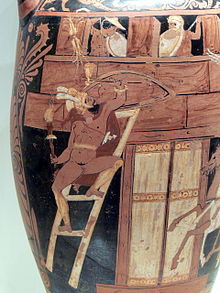Seven against Thebes
| Seven against Thebes | |
|---|---|

Scene from the Seven against Thebes: Capaneus scales the city wall of Thebes, Campanian red-figure amphora, ca. 340 BC, Getty Villa (92.AE.86)
|
|
| Written by | Aeschylus |
| Chorus | Theban Women |
| Characters |
Eteocles Antigone Ismene Messenger |
| Setting | Citadel of Thebes |
Seven Against Thebes (Ancient Greek: Ἑπτὰ ἐπὶ Θήβας, Hepta epi Thēbas; Latin: Septem contra Thebas) is the third play in an Oedipus-themed trilogy produced by Aeschylus in 467 BC. The trilogy is sometimes referred to as the Oedipodea. It concerns the battle between an Argive army led by Polynices and the army of Thebes led by Eteocles and his supporters. The trilogy won the first prize at the City Dionysia. The trilogy's first two plays, Laius and Oedipus, as well as the satyr play Sphinx, are no longer extant.
When Oedipus, King of Thebes, realized he had married his own mother and had two sons and two daughters with her, he blinded himself and cursed his sons to divide their inheritance (the kingdom) by the sword. The two sons, Eteocles and Polynices, in order to avoid bloodshed, agreed to rule Thebes in alternate years. After the first year, Eteocles refused to step down, leading Polynices to raise an army of Argives (captained by the eponymous Seven) to take Thebes by force. This is where Aeschylus' tragedy starts.
Seven Against Thebes features little action; instead, the bulk of the play consists of rich dialogues between the citizens of Thebes and their king Eteocles regarding the threat of the hostile army before their gates. Dialogues show aspects of Eteocles' character. There is also a lengthy description of each of the seven captains that lead the Argive army against the seven gates of the city of Thebes as well as the devices on their respective shields. Eteocles, in turn, announces which Theban commanders he will send against each Argive attacker. Finally, the commander of the troops before the seventh gate is revealed to be Polynices, the brother of the king. Then Eteocles remembers and refers to the curse of their father Oedipus. Eteocles resolves to meet and fight his brother in person before the seventh gate and exits. Following a choral ode, a messenger enters, announcing that the attackers have been repelled but that Eteocles and Polynices have killed each other in battle. Their bodies are brought on stage, and the chorus mourns them.
...
Wikipedia
